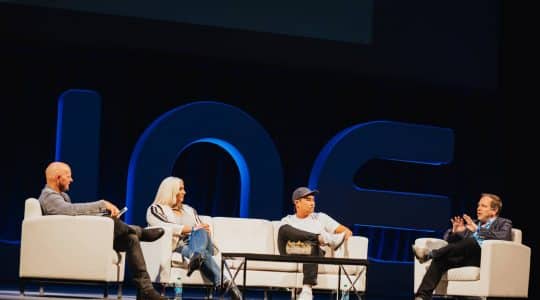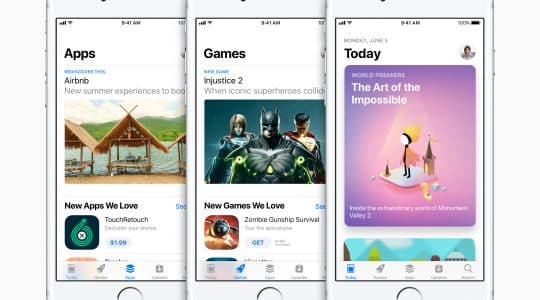We sat down with Ryan Morel of PlacePlay for a two-part video series on mobile ad targeting and app monetization.
PlacePlay is a geo-targeted ad network which helps app publishers monetize their apps better. Ryan is CEO and has incredible experience with helping app publishers make more money.
Part 2 of the conversation will be posted tomorrow to this blog, but is available on YouTube already.
Transcription
Ian: Welcome everybody. I’m Ian Sefferman, from MobileDevHQ. We’re here today with Ryan Morel of PlacePlay. Welcome.
Ryan: Thanks, Ian. Nice to see you.
Ian: Nice to see you as well. So tell us a little about PlacePlay. How do developers use your product to monetize their app?
Ryan: Sure. PlacePlay really does two specific things. One, we provide features that make location and social graph relevant in games. Those features include things like location based and social leader boards in tournaments, integrated push notifications, and a bunch of really great stuff that actually does drive engagement. We’ve seen that increase by up to 3x for people that have integrated in their games. So the big benefit of those features beyond engagement, which is obviously great, is it gets us access to location and social data, which we can use to provide targeted in- app advertising, in the form of typically banner ads. But we’ll be starting to do interstitial ads as well towards the beginning of the fall.
Ian: Great. So you talk about location and social being good targeting data. How does that make a more of an impact for a developer than what’s currently used traditionally right now?
Ryan: Sure. A big percentage of the mobile advertising we see today is essentially random, right? So you integrate advertising into your app, and you serve whatever an ad network wants you to serve, regardless of of who’s playing your app, or playing your game, or using your app, or whatever it is.
What location and social graph data enable us to do is get to a more fine grained level of advertising. Where we can serve you something that’s going to be relevant to either where you were located. So maybe there’s a restaurant down the street that’s interested with connecting with people around them. Of course that makes sense. Or with social data, even if we know male-female, that’s going to change things dramatically, right? So for example, and this might be a silly example, but I’ve played games before, and I see an app for “Flower Girl Mania” or something like that. Okay, that’s great for 50% of the population, but not me. So if we have social data, we can cutout the 50% of the ads that don’t make sense. If we have location data, we can start showing ads that are relevant to where the user is and provide them some value. That’s missing in the vast majority of mobile advertising today.
Ian: Sure. So talk a little bit about what the future of mobile ads look like. In particular what the future of mobile ad targeted looks like.
Ryan: Yeah. So, I think this is a little bit of a cliche, but everyone has always talked about the right ad, at the right place, at the right time. People have been talking about that since web advertising first started, right? And mobile is really the first medium that actually has a chance of becoming true. We know where you are, potentially. We know what time it is. And in some cases, we’re going to know who you are. So now we can deliver really personalized advertising experiences. Clearly, there’s some questions about how do you handle the privacy of this, and whether people feel sketched out by it. I think those are valid concerns, but I think people, in general, will forget about those concerns; or maybe worry less about them if they’re getting some value in return.
So if you think about advertising from the perspective of, “Gosh. I just have to put up with this, because that’s how these people monetize their content.” That’s not so great, right? If you think about it in terms of, “Hey. Is there advertising that can actually provide me value?” You actually like that, right? A really simple example that everyone talks about and knows about is Groupon, right? The vast majority of the Groupon offers you get suck. And you’re like, “God. I hate this.” But then there’s those times where the Groupon offer and you’re like, “This is awesome. I really want this,” and so you go buy it. Groupon is essentially in advertising business, right? And that’s really what I think becomes the future of mobile advertising. So right place, right time, right person, right?
The second part of this is, at least we believe, is a step away from continuously shown ad impressions and ad views, and towards showing the right ad only. So instead of showing UVN ads during your app experience as a banner ad, or every three minutes is an interstitial. We’ll either have something that’s relevant to you, or we won’t. And if we don’t, then we shouldn’t show anything, right? Because you’re not going to monetize your ads that don’t make sense for you anyway. So ultimately, that’s where I think mobile advertising goes.
Ian: Awesome. So you’re talking about Groupon, and how Groupon is basically a big advertising business. How does commerce affect the future of mobile ads?
Ryan: Yeah. Today, the only way that we’ve been able to close the loop with mobile advertising, and it’s hard, is with app installs, right? So it’s really hard to know if there’s a tangible effect for running a banner ad, unless someone installs an app. So, when we start to get into things like mobile payments, with location based advertising, now we can start enable commerce to happen at a really local level, and we can close the loop, right? That’s super interesting for small businesses. And it’s fantastic for users, and developers are going to love it too, right?
Ian: Sure.
Ryan: Because they’re going to get paid more. So it’s kind of this soft nebulous thing for someone to pay per click or for a certain number of impressions. But if they’re paying for something that they know generated revenue for them and a new customer; then that’s something they’re going to put more money into.
Ian: Absolutely.
Ryan: I think the interesting thing is going to be how it all shakes out, and whether or not people can actually generate the revenue required to support a business; using freemium as standalone model. We’ve seen and we’ve talk to smaller app developers all the time…
Author
Becky is the Senior Content Marketing Manager at TUNE. Before TUNE, she handled content strategy and marketing communications at several tech startups in the Bay Area. Becky received her bachelor's degree in English from Wake Forest University. After a decade in San Francisco and Seattle, she has returned home to Charleston, SC, where you can find her strolling through Hampton Park with her pup and enjoying the simple things between adventures with friends and family.






Leave a Reply
You must be logged in to post a comment.